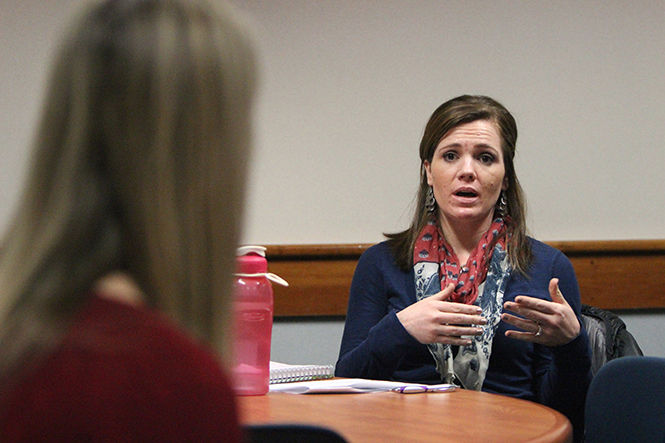Battle wounds are more than physical scars for veterans
Senior clinical mental health counseling major and Army medic veteran Jessica Knicely talks about how she deals with suicidal clients at her internship at a Peer Mental Suicide Training session on the third floor of the Student Center on Friday Feb. 6, 2015.
February 8, 2015
Veterans are coming home with more than just battle wounds.
Psychological disorders, such as post-traumatic stress disorder (PTSD) and traumatic brain injury (TBI), affect more than 20 percent of the 2.7 million veterans who have served, according to a study by the RAND Corporation.
PTSD and TBI could make day-to-day life activities hard for veterans and others who have experienced a traumatic event, Kirsten DeLambo, a staff psychologist at the DeWeese Health Center. The transition from the regimented military life to being a college student is a common trigger for some veterans, she said.
“(With the military), It’s very clear what your mission is and when you’re going to class or working on assignments, it’s incredibly different,” DeLambo said. “(People with these disorders) can experience anxiety that can come out of everyday actions like attending classes or sporting events.”
Symptoms of post-traumatic stress disorder come in three different clusters: reexperiencing, avoidance and hyperarousal. The most common of the three is reexperiencing the event whether it is in nightmares or through troubling thoughts.
In student veterans, the symptoms can be expressed with general anxiety.
Josh Rider, the director of the Center for Adult and Veteran Services, said this anxiety can take form in social situations like class discussions or involvement in clubs or organizations and can result in other psychological problems like depression and suicidal thoughts.
On the Kent State campus there is an effort being made to ensure veterans get the help they need with psychological problems they may face.
During the fall semester of 2010, Josh Rider and Rachael Anderson created the Peer Mentoring Training Program. The program is for veterans, service members, dependents and anyone who works with veterans on a regular basis.
The program was created as a way to get veterans and others talking about psychological problems that may occur and as a way to inform them of the signs and signals of PTSD and TBI.
“It helps them realize that they’re not the only student veteran on campus and that they’re not the only one who has concerns.” Rider said. He said it also helps begin a connection and conversation with campus resources and others who will be able to help students in need.
DeLambo agrees the program is important because it gives the participants the tools they need in a situation where someone might be in distress.
“Often peers are the most helpful people to do this because I’m not going to see most people at risk,” DeLambo said. “They’re not going to find my office and talk to a stranger, they’re going to talk to their friends.”
Rider said the best way for civilians to reach out to veterans who face these problems is to be a listening ear for them. He believes the real key is to be open, and if they know someone who is struggling, encourage them to seek professional assistance.
Ryan Lewand, a student veteran and junior criminology and justice studies major, looks forward to attending the event. He said he believes it is important because some veterans shut down and do not talk about things that might be troubling them, whether it is service related or not.
“It’s good for people to learn how to recognize the signs of depression and suicide,” Lewand said. “It’s good to let veterans know that they have a place to go if they need help.”
Contact Sky Fought at [email protected].












